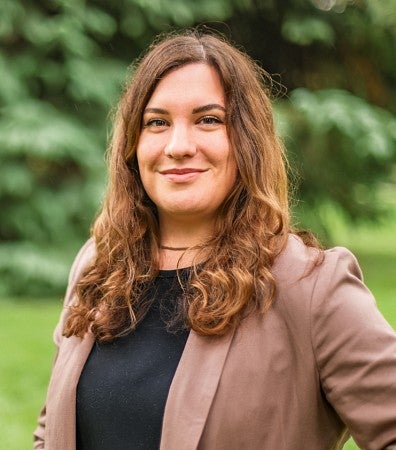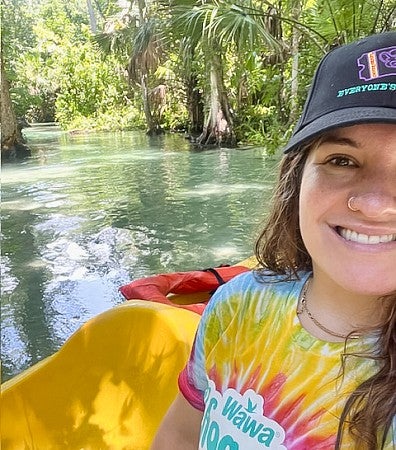
Renee Mitson
Assistant Professor of Public Relations
Hometown: Providence, Rhode Island, but Eugene is my new home!
Hobbies: Biking, cross-stitching and cooking
Favorite book: I dedicated my dissertation to some of my favorite fictional characters. I loved the “Golden Compass” (also known as His Dark Materials) series growing up. I also love Jane Austen. I just re-read her six novels. I’m currently re-reading classics, such as “The Count of Monte Cristo.” The books I usually lend to people are “This Is Where I Leave You,” “Ready Player One” and “Ender’s Game.”
Favorite music: I love everything from Prince to Kacey Musgraves to Metric to Garbage.
Favorite quote: "A man sees in the world what he carries in his heart." —Johann Wolfgang von Goethe
I guess because I really believe we have a great deal of say in how we see and interpret the world around us. And there’s really no point in being negative. Sad, upset, disappointed? Sure. But hopeful.
Say “hello!”: Connect with Renee on LinkedIn, X and Instagram.
Renee Mitson thinks we should not underestimate the value of internal communication when it’s handled well. After all, most of us spend a hefty chunk of our lives at work, and one factor that can make that time unbearable is a bad boss.

When organizations communicate well, employees are engaged, emotionally healthy and challenged, Mitson says.
That focus on the importance of internal communications is one of the reasons she accepted the position of assistant professor of public relations.
She also hopes to instill in her students an understanding and skepticism of emerging technologies like artificial intelligence. Her aim is to develop strategic communicators who are able to think clearly and explain AI to others.
Mitson, in her own words, delved further into her career and projects.
Who has been the biggest influence on your career?
Renee Mitson: Probably my parents. They don’t do what I do, but they are just really open-minded and don’t lead with fear. When I left my corporate career to go back to grad school, everyone openly doubted my decision, but they saw it as an adventure.
Why did you decide to join the UO School of Journalism and Communication faculty?
RM: The bike lanes, the beautiful campus, the strong public relations offerings and the faculty. There are plenty of communication schools that are not forward-thinking — Oregon is not one of them. I was also excited to join the SOJC faculty because of their interest in expanding in-house/internal/organizational communication courses. Even if you started in agencies like I did, many of us do a great deal of internal communication work, and it can be so challenging and interesting.

What do you hope to accomplish at the SOJC?
RM: I hope to expand my research, mentor graduate students and show undergrads what a flexible, dynamic and lucrative career strategic communication can be.
What do you hope students will gain from your classes?
RM: Critical thinking. While technology is important and understanding industry trends is certainly important, knowing how to think strategically and carefully is invaluable wherever you end up working.
Much of your past work focuses on how leadership communication and technology impact future perceptions and actions. What inspired you to develop an interest in that?
RM: Multiple factors sparked my interest. Most people have had a bad boss. So we, as a society, know how important it is that leaders lead and communicate well. Second, most of us spend a lot of our lives at work. So I believe that being engaged, emotionally well and challenged in the workplace are so important, and I think when an organization communicates well, that can be achieved.
Your recent publication “Beyond the Byline” focuses on biases in human-written versus AI-generated news. How do you see AI impacting academic and professional situations?
RM: I think it’s important to think carefully about AI. I think many students are scared that they will need to become software engineers because of AI, but that isn’t true. Organizations are looking for people who can think clearly and explain AI well to others, and who know enough to strategize how and when to use it (and when not to).
—By Ethan Donahue, class of ’26
Ethan Donahue is a journalism major with a double major in history. He is part of the School of Journalism and Communication’s direct-admit and honors programs. He is also part of the Clark Honors College. He holds an interest in investigative and conflict journalism and is working on a thesis focusing on how journalism, propaganda and the U.S. government interact during conflicts.
